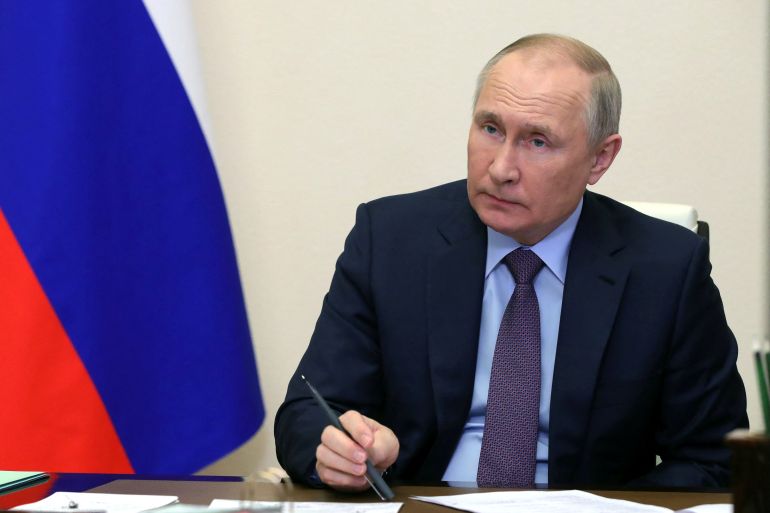The Kremlin blinks first in the geo-economic war over Ukraine
Russia avoided sovereign default, but at a high cost.

The ongoing geo-economic conflict between Russia and the West is a complicated one, surrounded by nearly as much disinformation and misinformation as the war in Ukraine itself. As such, both parties are confidently claiming to have the upper hand. But looking at the evidence at hand objectively, it becomes clear that the Kremlin is in retreat.
On April 29, Russia’s finance ministry announced that it would pay some $650m to foreign creditors on two overdue Eurobonds. And by making the payments before the bonds’ grace period expired on May 4, the Kremlin has avoided falling into sovereign default.
Keep reading
list of 4 itemsRussia-Ukraine war: List of key events, day 809
Russia’s Putin to remove Sergei Shoigu as defence minister
Ukraine’s military chief admits ‘difficult situation’ in Kharkiv region
On the surface, this may look like a win for Russia. But in reality, the move was an embarrassing one for Vladimir Putin.
Ahead of the bond’s formal maturity on April 4, the Kremlin announced that it would buy back the bonds in roubles – and pay those who refused to accept the rouble buy-back as well. Nearly 75 percent of bondholders (almost certainly all domestic) agreed to the new terms .
Emboldened, the Kremlin announced on April 6 that it was also depositing roubles into accounts set up for other bondholders. The Credit Derivatives Determinations Committees judged this to be a “potential-failure-to-pay” event, ruling that Russia would effectively be in default if it fails to correct the situation by the aforementioned May 4 deadline. In response, Russian officials accused the West of attempting to force Russia into a default by restricting its access to foreign currency reserves. The US Treasury, which oversees sanctions, however made clear that sanctions do not bar Russia from paying with funds it was earning from ongoing oil and gas sales.
Russia’s recent decision to pay the bonds in foreign currency enabled it to avoid the all-but-guaranteed acceleration of other debts and lawsuits that would have followed a default and further impoverished the Russian people.
However, the move also left the Kremlin in a position of extreme hypocrisy and embarrassment. In the end, what Putin did was to repay domestic bondholders with roubles, which they cannot convert freely into hard currency to spend abroad. And pay foreign holders in full, in dollars – hardly a feat worthy of praise.
To achieve this Putin likely tapped into the record levels of foreign currency Russia accumulated through oil and gas sales since the beginning of its invasion of Ukraine.
And it seems, soon it may also lose that crucial income.
On May 4, the European Union proposed plans to phase out the purchase of Russian oil.
Between the launch of its invasion on February 24 and the time of writing, Russia has earned $22bn from oil sales to the EU according to the Centre for Research on Energy and Clean Air (CRE). This record income was partially due to high hydrocarbon prices resulting from the war itself. Russia’s foreign currency stockpile, however, will not keep growing forever as the costs of the war are borne and oil and gas markets readjust. And now, it is also on the verge of losing a key customer.
Furthermore the EU is going after Russia’s oil sales not just within the bloc but around the world.
The bloc’s package of sanctions measures also includes a ban on providing transportation to Russian oil, regardless of where it is destined. This is certainly a fallible measure, given shipping companies set up outside the bloc could avoid it. However, the package will also bar the provision of insurance services for such shipping. This is far more difficult to evade, given the shipping insurance market is so dominated by EU, Canadian and US firms.
In case there is any doubt just how exposed the shipping sector is to Western sanctions, one just needs to look to the actions of Russian state-owned shipping company Sovcomflot. On May 3 specialist maritime industry publication Lloyd’s List revealed that Sovcomflot was looking to sell at least 40 ships from its 121 ship fleet before wind-down authorisations expire and it becomes fully sanctioned on May 15.
If Sovcomflot fails to raise enough cash to honour its debts before then, it will fall into default and creditors will go after its ships. Just like the Russian state, Russian businesses are still fearful of defaulting on Western creditors – even amid a war.
These sanctions are unlikely to be lifted as long as Russian troops remain beyond the pre-February 24 lines of control. For example, none of the sanctions introduced after Russia’s annexation of Crimea have ever been lifted.
Despite these setbacks, there is clearly some fight left in Russia, which is using its gas sales to Europe to try and ensure that the rouble remains convertible even as sanctions are further tightened, and thus that it can at least buy foreign currency if and when needed.
The Kremlin is likely to cut off other EU countries and companies who refuse to comply with the gas-for-roubles demand, as it already has with Poland and Bulgaria. But gas sales to Europe are an even more important source of revenue for the Kremlin. Pipelines are expensive to replace, and the above mentioned shipping sanctions are applied to liquefied natural gas (LNG) cargoes as well. Europe should prepare to call Putin’s bluff.
The West is winning the geo-economic war. The Kremlin will blink again.
The views expressed in this article are the author’s own and do not necessarily reflect Al Jazeera’s editorial stance.
